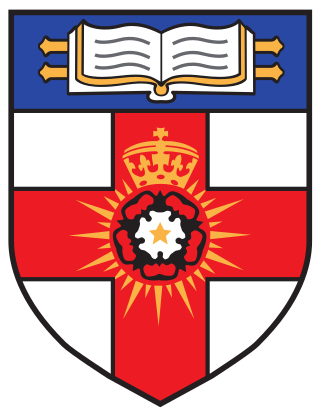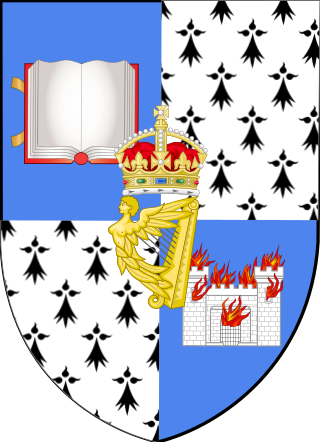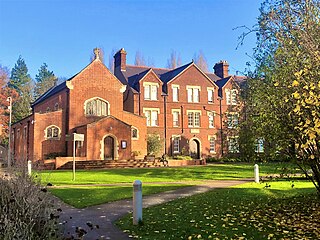Related Research Articles

The University of London is a federal public research university located in London, England, United Kingdom. The university was established by royal charter in 1836 as a degree-awarding examination board for students holding certificates from University College London and King's College London and other such institutions, corporate or unincorporated, as shall be established for the purpose of Education, whether within the Metropolis or elsewhere within our United Kingdom". This fact allows it to be one of three institutions to claim the title of the third-oldest university in England, and moved to a federal structure in 1900. It is now incorporated by its fourth (1863) royal charter and governed by the University of London Act 2018.

The University of Dublin, corporately designated the Chancellor, Doctors and Masters of the University of Dublin, is a university located in Dublin, Ireland. It is the degree-awarding body for Trinity College Dublin. It was founded in 1592 when Queen Elizabeth I issued a charter for Trinity College as "the mother of a university", thereby making it Ireland's oldest operating university. It was modelled after the collegiate universities of Oxford and of Cambridge, but unlike these other ancient universities, only one college was established; as such, the designations "Trinity College" and "University of Dublin" are usually synonymous for practical purposes.

St Edmund's College is a constituent college of the University of Cambridge in England. Founded in 1896, it is the second-oldest of the four Cambridge colleges oriented to mature students, which accept only students reading for postgraduate degrees or for undergraduate degrees if aged 21 years or older.

Homerton College is a constituent college of the University of Cambridge. Its first premises were acquired in Homerton, London in 1768, by an informal gathering of Protestant dissenters with origins in the seventeenth century. In 1894, the college moved from Homerton High Street, Hackney, London, to Cambridge. Homerton was admitted as an "Approved Society" of the university in 1976, and received its Royal charter in 2010, affirming its status as a full college of the university. The college celebrated its 250th anniversary in 2018.

Universities UK (UUK) is an advocacy organisation for universities in the United Kingdom. It began life in the early 20th century through informal meetings of vice-chancellors of a number of universities and principals of university colleges and was previously known as the Committee of Vice-Chancellors and Principals of the Universities of the United Kingdom (CVCP). As of July 2022, UUK is led by President Steve West – Vice-Chancellor of the University of the West of England – and Chief Executive Vivienne Stern. UUK is registered charity with an annual income of £13.7 million, which is largely raised from its member institutions.

The Cambridge Philosophical Society (CPS) is a scientific society at the University of Cambridge. It was founded in 1819. The name derives from the medieval use of the word philosophy to denote any research undertaken outside the fields of law, theology and medicine. The society was granted a royal charter by King William IV in 1832. The society is governed by an elected council of senior academics, which is chaired by the Society's President, according to a set of statutes.
A chancellor is a leader of a college or university, usually either the executive or ceremonial head of the university or of a university campus within a university system.

The University of Natal was a university in the former South African province Natal which later became KwaZulu-Natal. The University of Natal no longer exists as a distinct legal entity, as it was incorporated into the University of KwaZulu-Natal on 1 January 2004. It was founded in 1910 as the Natal University College in Pietermaritzburg and expanded to include a campus in Durban in 1931. In 1947, the university opened a medical school for non-white students in Durban. The Pietermaritzburg campus was known for its agricultural engineering programmes, hence the nickname "the farmers" whilst the Durban campus was known as "the engineers," as it concentrated on other engineering programmes.
The General Council of the University of St Andrews is the corporate body of all graduates and senior academics of the University of St Andrews in Scotland. It was instituted by the Universities (Scotland) Act 1858, but its constitution and organisation have been considerably altered by subsequent statutes.
The governance of the University of St Andrews is laid down in a series of Acts of Parliament enacted between 1858 and 1966, and the Higher Education Governance (Scotland) Act 2016.
An academic senate, sometimes termed faculty senate, academic board or simply senate, is a governing body in some universities and colleges, typically with responsibility for academic matters and primarily drawing its membership from the academic staff of the institution.

The Michael Okpara University of Agriculture, originally the Federal University of Agriculture, is a federal university in Umudike, Abia State, Nigeria was established as a specialized University by a Federal Government of Nigeria Decree No 48 of November 1992. It began formal activities in May 1993 with the appointment of the first Council and Vice-Chancellor Professor Placid C. Njoku on 27 May 1993, while other key officials of the University were appointed later.
A university council may be the executive body of a university's governance system, an advisory body to the university president, or something in between in authority.
The governance of the University of Bristol is organised under a number of key positions; including the Chancellor, Vice-Chancellor, Pro Vice-Chancellors and the Registrar.
The ancient university governance structure in Scotland is the organisational system imposed by a series of Acts of Parliament called the Universities (Scotland) Acts 1858 to 1966. The Acts applied to what were termed the 'older universities': the University of St Andrews, the University of Glasgow, the University of Aberdeen and the University of Edinburgh. Together these four universities are commonly referred to as the ancient universities of Scotland. Whilst the Acts do not directly apply to the University of Dundee, the same governance structure was ordained for use by that institution in its royal charter.

The Cambridge University Reporter, founded in 1870, is the official journal of record of the University of Cambridge, England.
A head of college or head of house is the head or senior member of a college within a collegiate university. The title used varies between colleges, including dean, master, president, principal, provost, rector and warden.

The University of Cambridge is a public collegiate research university in Cambridge, England. Founded in 1209, the University of Cambridge is the third-oldest university in continuous operation. The university's founding followed the arrival of scholars who left the University of Oxford for Cambridge after a dispute with local townspeople. The two ancient English universities, although sometimes described as rivals, share many common features and are often jointly referred to as Oxbridge. In 1231, 22 years after its founding, the university was recognised with a royal charter granted by King Henry III.

Alexander Hill was a medical doctor and professor who was Master of Downing College, Cambridge from 1888 to 1907 and Vice-Chancellor of the University of Cambridge from 1897 to 1899. He was Principal of Southampton University College from 1913 to 1920.
The Chapter General of the Order of Malta is the legislative body of the Sovereign Military Order of Malta. The Constitution describes it as "the supreme organ of governance of the Order." It meets every six years, mostly recently on 1-2 May 2019.
References
- ↑ Statute A, IV: Statutes and Ordinances of the University of Cambridge
- ↑ "The University as a charity". University of Cambridge. 21 March 2013. Retrieved 4 January 2022.
- 1 2 "Council membership".
- ↑ Reporter 15/12/04: Annual Report of the Council for 2003-04
- ↑ Grace 2 of 5 December 2008
- ↑ Acta in the Reporter, No 6107, publishing Results of Ballot
- ↑ Reporter 23/07/08, Statutes approved: Notice
- ↑ "Meeting dates of the Council and Business Committee". www.governance.cam.ac.uk. Retrieved 4 January 2022.
